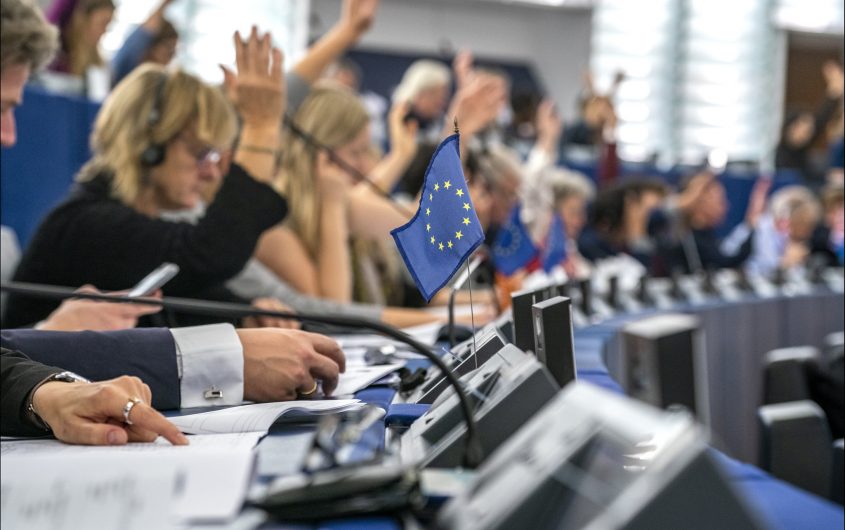
European Parliament via Flickr
Changing German Views Point to a Brighter Future for EU Foreign Policy

Nick Lokker
Georgetown University
Nick Lokker is a graduate student at Georgetown University’s Walsh School of Foreign Service, where he is pursuing his MA in German and European Studies. He has an academic focus on transatlantic security policy and EU-Russia relations. Nick previously worked for AICGS as a research intern during the summer of 2020. His duties included assisting the AICGS president and fellows with research as well as writing for the AICGS website.
Nick's other work experience includes internships with the Center for a New American Security's Transatlantic Security Program, the Center for European Policy Analysis, and the European Parliament. He speaks French, Spanish, and some German and Russian.
The European Union is not known for its hard power. Despite its status as an economic and regulatory superpower, the EU has consistently failed to exert true influence in crises around the globe, from Syria to Libya to Hong Kong. While there are numerous proximate causes for this strategic absence, they all ultimately boil down to a fundamental lack of political will among member states to prioritize broad EU interests over narrow national ones and forge a stronger Common Foreign and Security Policy (CFSP).
Within the complex patchwork of institutional and intergovernmental competencies that defines the EU, responsibility for defense and foreign policy remains firmly in control of the member states. This means that most consequential decisions on CFSP are made by the political executive of the European Council, rather than the administrative executive of the European Commission. Action on CFSP must therefore originate from the European public—if voters express a desire for a stronger EU foreign policy, it will be in the interest of elected heads of state and government in the European Council to act accordingly.
Among Germans, there is growing evidence that younger generations want a more ambitious foreign policy—including a stronger Europe. Further exploration of these trends reveals that support for strengthening CFSP could soon make both electoral and strategic sense, becoming an increasingly prominent component of German government policy going forward.
Winds of Change
The German public as a whole increasingly wants a more capable CFSP: over the past decade, the percentage of Germans supporting a “common foreign policy of the EU” has risen by ten points. This may be explained by large differences in opinion between older and younger Germans. A June 2020 report by the Global Public Policy Institute revealed that 64 percent of Germans between the ages of 18 and 29 would like to see the EU “engage more” in global conflict resolution. In stark contrast, only 51 percent of Germans ages 30 or older shared this view.
Another indicator of youth support for a stronger CFSP is the foreign policy agenda of the German Green party, which is now the preferred party among young Germans. According to an analysis by The Economist in January 2020, the Greens promote “a foreign policy combining ethics with realism, all wrapped in an EU flag.” This assessment is supported by statements from party leadership. For example, Robert Habeck, co-leader of the Greens, expressed his disappointment with a lack of coordination in EU foreign policy after the bloc’s failure to agree on opening accession taIks with Albania and North Macedonia in late 2019, saying: “We see that Europe is unfortunately not really able to talk together about foreign policy right now. In my view, that was really fatal.”
Taken together, these data suggest an ongoing reorientation in German foreign policy preferences toward a larger role for the EU.
Taken together, these data suggest an ongoing reorientation in German foreign policy preferences toward a larger role for the EU. While this evolution should largely be interpreted as a possible harbinger of things to come, the EU has in fact already built some momentum toward a stronger CSFP in recent years. For instance, European Commission president Ursula von der Leyen famously stated her ambition to create a “geopolitical” EU upon taking the reins in late 2019, and recent initiatives begun under the previous Juncker Commission such as the European Defence Fund (EDF) and Permanent Structured Cooperation (PESCO) demonstrate an increased appetite for security and defense integration, although their true scope remains uncertain. At the national level, France’s Emmanuel Macron has repeatedly called for greater European sovereignty and proposed measures such as a more effective EU mutual defense clause and a European Security Council.
According to a common narrative, Germany has impeded these aspirations. Proponents of this view believe that “strategic thinking has been put on hold as the country awaits the end of the Merkel era,” and express frustration that “German responses to Macron’s European initiatives have ranged from the lukewarm to the dismissive.” Although it is true that German leaders have been more reserved in their rhetoric, for example avoiding the term “strategic autonomy,” this does not mean that they disagree with the vision of a stronger EU in the world. In fact, foreign minister Heiko Maas endorsed Macron’s call for a European Security Council, while Merkel has explicitly voiced her support for greater EU security cooperation.
Although it is true that German leaders have been more reserved in their rhetoric, for example avoiding the term “strategic autonomy,” this does not mean that they disagree with the vision of a stronger EU in the world.
Looking toward the future, it is reasonable, then, to expect that the existing momentum for a more robust CFSP could accelerate if current trends hold. This would be a positive development for Germany, Europe, and the transatlantic relationship.
The Promise of the EU for German Foreign and Security Policy
Allies frequently criticize Germany’s reluctance to prioritize foreign and security policy. Noting the country’s low defense spending, unprepared military, and inaction in international crises, many outside observers accuse Germans of freeriding on the security commitments of the United States and other NATO allies. Though this criticism may be valid, it is essential to keep in mind the legitimate basis for German reluctance to engage abroad—namely, the disastrous history of the Second World War. Nevertheless, it is undeniable that Germany must change its status quo to manage the steadily increasing instability of its neighborhood and the world at-large. Whether by helping to secure conflict zones in Europe’s neighborhood or by taking a firmer stance against human rights violations by China and others, greater German engagement will allow the country to resist threats to its values and interests.
In the past, the United States would have pushed for allies to engage on international security issues through NATO, and German leaders would have in turn prioritized NATO as the most important pillar of Germany’s security, stressing the need to avoid duplication of NATO’s capabilities in the EU. Now, however, the Trump administration’s deep skepticism of NATO and allies more generally, coupled with President Trump’s extreme unpopularity in Germany, has cast doubt on the effectiveness of the Atlantic alliance as a vehicle for many forms of security policy engagement.
Enter the EU. Through enhanced CFSP cooperation, Germany can bolster its ability to act while minimizing any fear among neighbors that it will revert to aggressive historical tendencies. Furthermore, other member states should logically welcome a greater commitment by the EU’s largest country to the security of the bloc as a whole.
Addressing Concerns About CFSP
It is important to acknowledge the current resistance that exists among some EU countries to a stronger CFSP. Officials in Poland and the Baltic States, for example, have expressed concerns that a push for greater European capabilities could undermine the NATO alliance and thus their safety from Russian aggression. This view may seem justified by past U.S. government criticism of initiatives such as the EDF and PESCO, which has warned Brussels of the potential for duplication of NATO structures and decoupling of American and European security.
While officials from the European Commission have consistently emphasized that a more integrated CFSP would not aim to replace NATO and would in fact only strengthen the alliance, actions speak louder than words. One of the most significant sources of American pushback toward these programs is the question of third-party participation. Many in the U.S. fear that if the country’s defense firms cannot participate in EU projects, they will in time lose access to the European market. Some EU member states (including the Balts and Poles, but also the Nordics) share this unease, worrying that the projects will miss out on the benefits of involving some of the world’s most advanced defense companies.
Many in the U.S. fear that if the country’s defense firms cannot participate in EU projects, they will in time lose access to the European market.
Resolving this question would go a long way toward easing tensions. The ongoing discussions between member states, the Commission, and the European Parliament about the legislative implementation of the EDF present an opportunity to provide crucial reassurance by formally declaring that participation will be open to friendly third countries. Germany in particular could leverage its current presidency of the Council of the EU to push for a such a position.
For its part, the U.S. should recognize that a more capable EU is in its interest. As American foreign policy increasingly shifts its focus toward China, it will be less able to direct resources to other regions of the world. By encouraging Europe to develop its CFSP, the U.S. can in time transfer more of the burden for the continent’s security.
An Uncertain Future
None of this will happen without decisive action from Germany, the EU’s indispensable nation. While the aforementioned changing foreign policy views among Germans are cause for optimism about the future of CFSP, they are of course no guarantee that the EU will build itself into a true global actor. After all, previous predictions that the “hour of Europe” had arrived in the early 1990s quickly proved premature when faced with the reality of the Balkan wars. Nevertheless, both the EU and the global political climate have changed considerably over the past thirty years. Perhaps now is the time for a true transformation.









